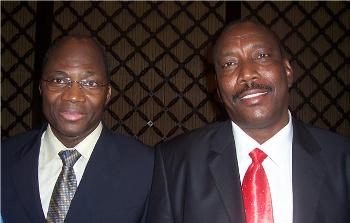UN-AU joint mediator meets with Darfur URF leader
June 29, 2009 (PARIS) — The joint African Union (AU) – United Nations (UN) mediator Dijibril Bassole met today in the Libyan capital with the leader of the Darfur rebel United Resistance Front (URF) Idriss Abu Garda.

The URF said that Bassole and Abu Garda agreed that the political talks are the only way to put an end to the Darfur conflict.
Furthermore, both figures stressed the need to refrain from “partial or bilateral” accords in dealing with the Darfur issue saying that they are willing to put all efforts in working towards a peaceful resolution working with all other groups.
Abu Garda, who is accused of leading an attack against African peacekeepers in 2007, appeared before a judge at the International Criminal Court (ICC), a day after he voluntarily surrendered himself to The Hague-based court on May 18.
Speaking to Sudan Tribune, at the time he asserted his innocence and pledged to prove it. Khartoum accuses the ICC of conspiring with the Darfur rebels against the Sudanese president.
The Sudanese government and Darfur JEM engaged in talks since February sponsored by the Arab Gulf state of Qatar.
An agreement of goodwill and confidence building was signed but last week the talks collapsed without any tangible progress. Both sides are scheduled to meet at the end of July.
Some rebel groups have criticized the talks saying they excluded them, dashing hopes for any sustainable peace agreement.
JEM has said in the past that only a couple of groups in Darfur should make it to the peace talks.
The other major rebel movement led by Abdel-Wahid Al-Nur refuse to join any peace talks without enforcing peace and security for IDP’s on the ground.
UN experts say 300,000 have died and 2.7 million been driven from their homes since rebels took up arms against Sudan’s government in 2003, accusing Khartoum of neglecting the region’s development. But Khartoum says 10,000 have died.
(ST)
